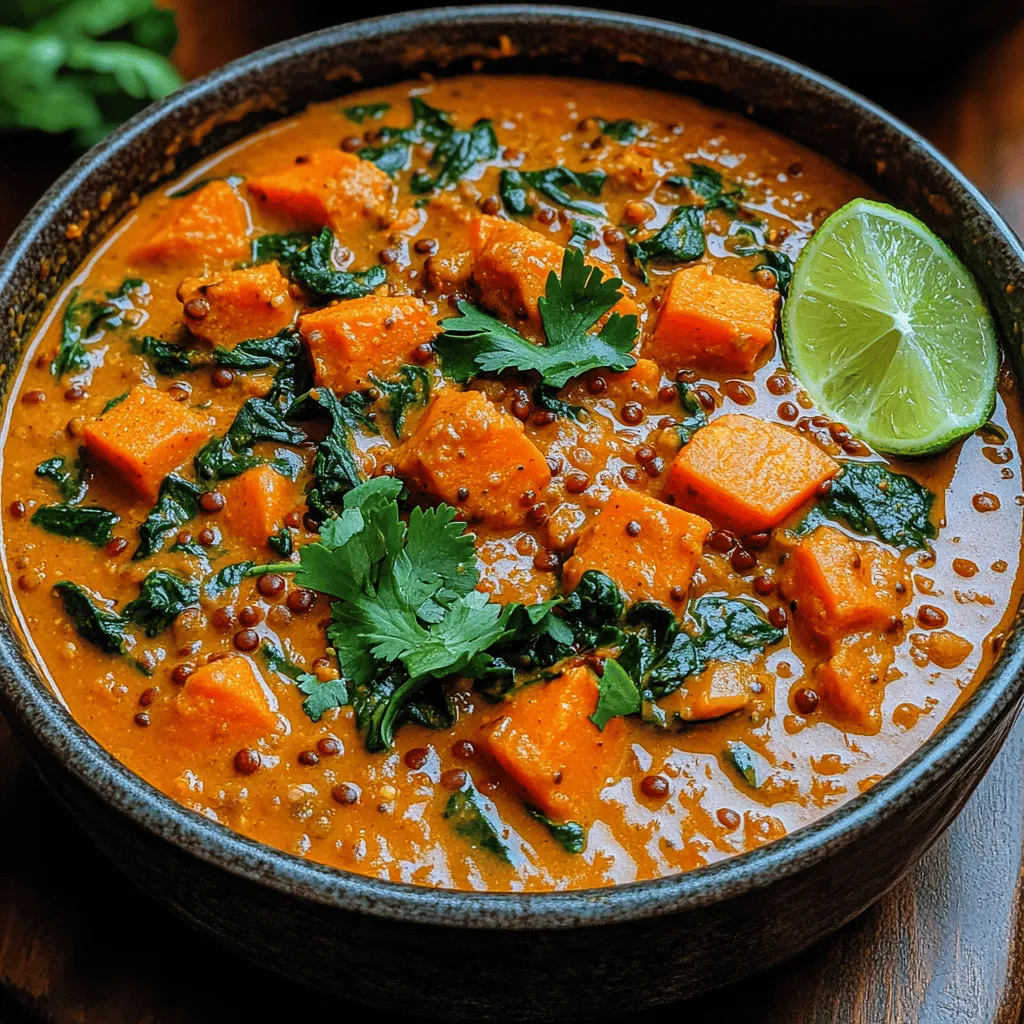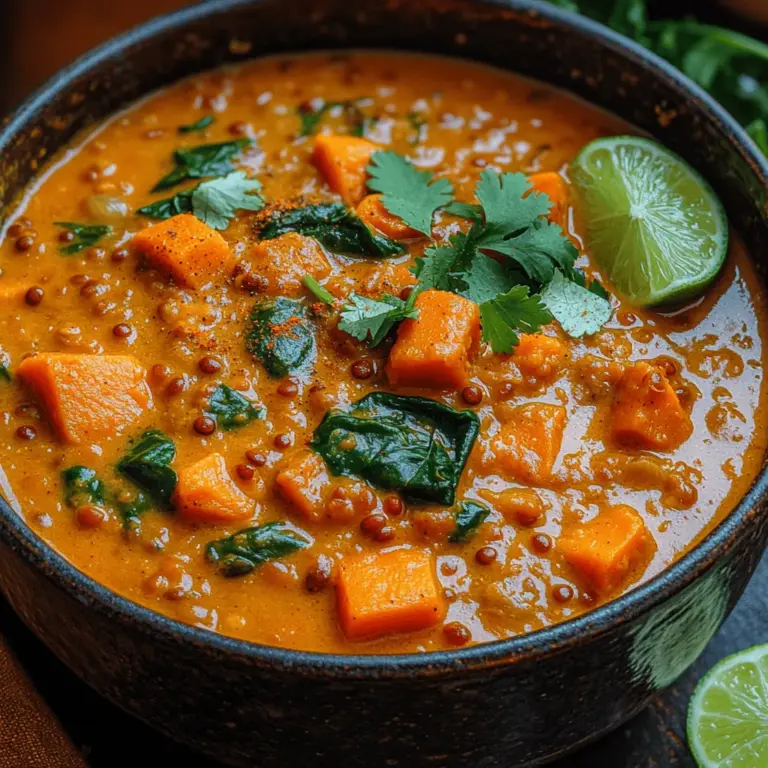In the realm of plant-based cuisine, few dishes can rival the comfort and nutrition offered by a hearty curry. The Savory Sweet Potato Lentil Curry is a delightful representation of what a well-crafted curry can be—an enticing blend of flavors, textures, and aromas that not only pleases the palate but also nourishes the body. This dish showcases key ingredients such as sweet potatoes, red lentils, and an array of spices, making it a perfect choice for busy weeknight dinners or meal prep sessions. As we dive deeper into this recipe, we will explore the unique benefits of each ingredient, provide a step-by-step cooking guide, and share serving suggestions to elevate your curry experience.
Understanding the Ingredients
A successful curry relies on a balance of wholesome ingredients that work harmoniously together. Let’s take a closer look at the star players in this Savory Sweet Potato Lentil Curry.
Sweet Potatoes: Nature’s Sweet Gift
Sweet potatoes are not only a staple in many kitchens but also a nutritional powerhouse. Packed with vitamins A and C, potassium, and dietary fiber, sweet potatoes are a fantastic addition to any meal. Their naturally sweet and creamy texture lends a soothing quality to the dish, making it particularly comforting.
What makes sweet potatoes versatile is their cooking adaptability; they can be boiled, mashed, roasted, or incorporated into curries. In this recipe, they bring a delightful sweetness that balances the spices, creating a rich and hearty flavor profile.
Red Lentils: A Protein Powerhouse
Red lentils are another essential ingredient in this curry. Known for their high protein and fiber content, they serve as a great plant-based protein source, making this dish not only filling but also nutritious. One of the advantages of red lentils is their quick cooking time; they tend to soften and cook faster than other varieties, which is perfect for weeknight meals.
In this curry, red lentils play a dual role—they not only add protein but also help thicken the dish, contributing to its creamy consistency. This makes them a favorite ingredient in various Indian and Middle Eastern recipes.
Coconut Milk: Creamy and Rich
Coconut milk is often revered in curry recipes for its creamy richness. It adds a luxurious texture and a subtle sweetness that enhances the overall flavor of the dish. Not only does coconut milk complement the spices beautifully, but it also contributes healthy fats, making the curry satisfying and hearty.
For those looking for alternatives, options like almond milk or cashew cream can be used to create a lighter version of the curry, although they may lack the depth of flavor that coconut milk provides. However, if you prefer a lower-fat option, light coconut milk can be a great substitute without compromising too much on the creamy texture.
Aromatics: Building Flavor Foundations
The foundation of any great curry lies in its aromatics. Onions, garlic, and ginger are fundamental in building the flavor profile of this dish. Onions add sweetness and depth, while garlic brings a pungent, savory note, and ginger provides a warming spiciness that elevates the entire curry.
Sautéing these ingredients properly is crucial for enhancing their flavors. The science behind sautéing aromatics involves releasing their natural oils and sugars, which intensifies their flavor and creates a robust base for your curry.
Spices: The Heart of Curry
No curry is complete without a well-thought-out blend of spices. In this recipe, we’ll use a mix of curry powder, cumin, turmeric, and paprika. Each of these spices contributes unique flavors and health benefits:
– Curry Powder: A blend of spices itself, typically including turmeric, coriander, and cumin, it offers a warm and complex flavor.
– Cumin: Known for its earthy and nutty notes, cumin also has digestive benefits, making it a staple in many cuisines.
– Turmeric: Renowned for its vibrant yellow color and anti-inflammatory properties, turmeric adds both health benefits and a warm flavor.
– Paprika: With its sweet, smoky undertones, paprika rounds out the spice mix and adds a beautiful color to the curry.
Adjusting the spice levels to personal taste preferences is easy, allowing for a customized curry experience that can cater to mild or bold flavor profiles.
Step-by-Step Guide to Making Savory Sweet Potato Lentil Curry
Sautéing the Aromatics
The first step in crafting your Savory Sweet Potato Lentil Curry is to sauté the aromatics. Begin by heating a generous drizzle of oil in a large skillet or pot over medium heat. You can use olive oil, coconut oil, or any neutral oil of your choice. Once the oil is shimmering, add finely chopped onions. Sauté the onions until they become translucent and slightly golden, which usually takes about 5-7 minutes.
Next, add minced garlic and grated ginger to the pan. These ingredients release their aromatic oils and create a fragrant base for your curry. Stir continuously for another 2-3 minutes, being careful not to let them burn, as this can impart a bitter taste to your dish.
Adding the Spices
After your aromatic base is ready, it’s time to add the spices. Sprinkle in the curry powder, cumin, turmeric, and paprika, stirring well to coat the onions, garlic, and ginger. This step is crucial, as toasting the spices in the oil enhances their natural flavors and aromas. Allow the spices to cook for 1-2 minutes, stirring frequently to prevent burning, until they become fragrant.
As you sauté the spices, you might notice the deepening of colors and the release of a delightful aroma that fills your kitchen. This is the moment when your curry begins to come to life, setting the stage for the addition of the remaining ingredients.
From here, your Savory Sweet Potato Lentil Curry is just a few steps away from completion, but first, let’s explore the rest of the cooking process and how to serve this delicious dish!

Suggested Variations for Spice Intensity
When it comes to crafting the perfect Savory Sweet Potato Lentil Curry, the level of spice can significantly influence the overall flavor profile. Here are some suggested variations to cater to your spice preferences:
– Mild Curry: If you prefer a milder curry, start with just a teaspoon of cumin and coriander. You can also omit any chili powder or fresh chilies. Instead, focus on enhancing the dish with aromatic spices like turmeric and ginger, which provide warmth without the heat.
– Medium Spice: For those who enjoy a moderate kick, use up to a tablespoon of curry powder or add a teaspoon of chili powder. This balance will give your curry a flavorful depth without overwhelming your palate.
– Spicy Curry: If you love heat, don’t hold back! Increase the chili powder to two tablespoons or add diced jalapeños or serrano peppers when sautéing the onions. Freshly grated ginger can also elevate the spice level while adding a zesty freshness.
– Herbal Infusion: To add a different dimension of flavor, consider incorporating herbs like coriander or mint towards the end of cooking. These can complement the spices and provide a refreshing contrast.
Incorporating Sweet Potatoes and Lentils
How to Properly Prepare and Combine These Ingredients
Before diving into cooking, it’s important to properly prepare your sweet potatoes and lentils. Start by peeling and dicing the sweet potatoes into even cubes—this ensures they cook uniformly. Aim for pieces about 1 inch in size, as smaller pieces will cook faster but can also become mushy.
For the lentils, rinse them thoroughly under cold water to remove any dust or debris. Although green or brown lentils work well in this recipe, red lentils are a popular choice for their quick cooking time and ability to break down into a creamy texture.
Tips for Achieving the Right Texture
To achieve the perfect texture in your curry, consider the following tips:
– Cook Time: Different types of lentils have varying cooking times. Green and brown lentils typically take 25-30 minutes to become tender, while red lentils cook in about 15-20 minutes. Pay attention to the type you are using and adjust your cooking time accordingly.
– Texture Preference: If you prefer a thicker curry, add less liquid during the cooking process. For a soupier consistency, increase the liquid amount. You can also mash some of the sweet potatoes and lentils against the side of the pot to thicken the curry while keeping some chunks for texture.
Pouring in the Liquid
Best Practices for Combining Liquids and Preventing Curdling
When it comes to adding liquid to your curry, it’s best to use vegetable broth or coconut milk for a rich flavor. If you choose to use coconut milk, add it towards the end of cooking to prevent curdling. This will help maintain its creamy texture and flavor.
– Combination Method: To avoid curdling, pour the coconut milk slowly while continuously stirring your pot. This will help integrate the milk into the curry without creating lumps.
Adjusting Liquid Amounts Based on Desired Thickness
As you develop your curry, keep in mind the amount of liquid you add will directly affect the thickness. A good starting point is to use about 2 cups of broth or water for every cup of lentils. You can adjust this based on your desired outcome:
– For a Thicker Curry: Start with less liquid (about 1.5 cups) and add more as needed while cooking.
– For a Soup-Like Consistency: Increase the liquid to 3 cups and adjust according to taste.
Cooking Time: The Key to Tenderness
Importance of Simmering for Flavor Development
Simmering is crucial in developing the rich, harmonious flavors of your curry. After bringing your mixture to a boil, reduce the heat to a gentle simmer. This slow cooking process allows the spices to meld together, enhancing the overall taste.
– Simmering Time: Aim for at least 20-30 minutes of simmering after adding the sweet potatoes and lentils. This will not only ensure that your ingredients become tender but also allow the spices to fully infuse their flavors.
How to Check for Doneness in Sweet Potatoes and Lentils
To determine if your sweet potatoes and lentils are cooked to perfection, follow these guidelines:
– Sweet Potatoes: They should be fork-tender but not falling apart. Check by inserting a fork into a piece; it should slide in easily but still hold its shape.
– Lentils: Taste a few lentils for doneness. They should be soft but still retain a slight bite (al dente). Overcooked lentils can turn mushy, so keep an eye on them as they cook.
Adding Greens: Nutritional Boost
Benefits of Incorporating Spinach or Other Leafy Greens
Adding greens to your Savory Sweet Potato Lentil Curry not only enhances the dish’s nutritional value but also adds a vibrant color. Spinach is an excellent choice due to its mild flavor and quick cooking time. It’s packed with vitamins A, C, and K, as well as iron and fiber.
Suggestions for Alternative Greens if Desired
If spinach isn’t available, consider using other leafy greens such as kale, Swiss chard, or collard greens. Here’s how to incorporate them:
– Kale: Chop into smaller pieces and add during the last 10 minutes of cooking to allow it to wilt and soften.
– Swiss Chard: Add both the stems and leaves for a more robust texture, cooking the stems for a few minutes before adding the leaves.
– Collard Greens: These can be tougher, so chop finely and add them earlier in the cooking process to ensure they become tender.
Serving Suggestions
Garnishing Your Curry
Garnishing your Savory Sweet Potato Lentil Curry enhances its visual appeal and flavor. Freshly chopped cilantro adds a burst of color and freshness that complements the rich spices. A squeeze of lime juice brightens the dish, balancing the sweetness of the potatoes and the earthiness of the lentils.
Other garnish options include:
– Chili Flakes: For an extra kick, sprinkle some red chili flakes on top.
– Yogurt or Coconut Cream: A dollop of yogurt or a swirl of coconut cream offers a creamy contrast to the spices.
– Toasted Nuts or Seeds: Add texture with a sprinkle of toasted pumpkin seeds or cashews.
Pairing with Side Dishes
To create a balanced meal, consider pairing your curry with:
– Rice: Basmati or jasmine rice are classic accompaniments that absorb the curry’s flavors beautifully.
– Quinoa: For a protein boost, serve your curry over quinoa, which adds a nutty flavor and additional nutrients.
– Flatbreads: Naan or roti can be used to scoop up the curry, making for a hearty and satisfying meal.
Nutritional Analysis of Savory Sweet Potato Lentil Curry
Caloric Breakdown
Estimating calories per serving will depend on your exact ingredients, but on average, a serving of Savory Sweet Potato Lentil Curry typically contains around 350-400 calories. This estimate includes the sweet potatoes, lentils, coconut milk, and spices.
– Macronutrient Distribution:
– Protein: Approximately 15-20 grams, primarily from lentils.
– Fats: Ranges from 10-15 grams, depending on the amount of coconut milk used.
– Carbohydrates: About 60-70 grams, mainly from sweet potatoes and lentils.
Health Benefits
The ingredients in this curry provide a wealth of health benefits:
– Sweet Potatoes: Rich in vitamins A and C, fiber, and antioxidants. They contribute to improved eye health and immune function.
– Lentils: A fantastic source of plant-based protein, fiber, and essential minerals like iron and magnesium. They support digestive health and can help manage blood sugar levels.
– Spices: Turmeric, cumin, and ginger have anti-inflammatory properties and may aid digestion.
Adopting a plant-based diet, like this curry, can lead to reduced risks of chronic diseases while promoting overall health and wellness.
Conclusion: Embracing the Comfort of Curry
Savory Sweet Potato Lentil Curry is more than just a meal; it’s a nourishing experience that brings warmth and comfort to the table. With its rich flavors and health benefits, this dish is an excellent addition to any dinner rotation. Whether you’re a seasoned cook or a novice in the kitchen, this recipe promises satisfaction and delight in every bowl. Embrace the simplicity and wholesomeness of this curry, and enjoy the delicious journey it offers.
With a few adjustments to spice levels and creative garnishing, your curry can be a unique expression of your culinary preferences. So gather your ingredients, roll up your sleeves, and savor the wonderful comfort that comes with each spoonful of this delightful dish.

